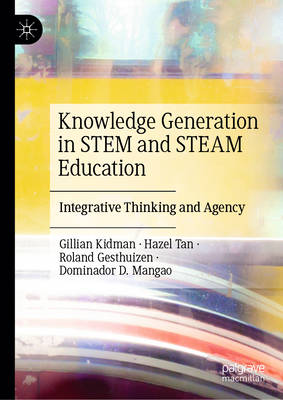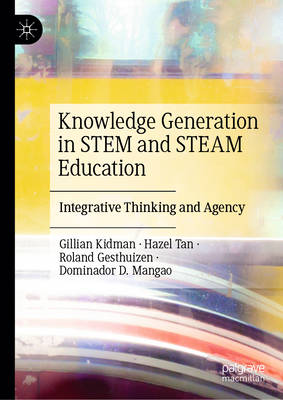
- Afhalen na 1 uur in een winkel met voorraad
- Gratis thuislevering in België vanaf € 30
- Ruim aanbod met 7 miljoen producten
- Afhalen na 1 uur in een winkel met voorraad
- Gratis thuislevering in België vanaf € 30
- Ruim aanbod met 7 miljoen producten
Zoeken
Knowledge Generation in Stem and Steam Education
Integrative Thinking and Agency
Gillian Kidman, Hazel Tan, Roland Gesthuizen, Dominador D Mangao
Hardcover | Engels
€ 128,45
+ 256 punten
Omschrijving
This book examines how integrative practices are conceived, described, and taught within the context of STEA+M education. STEA+M education is far more than a disciplinary expansion of STEM education; it is a paradigmatic shift in educational purpose and practice, offering a framework for rethinking how knowledge is produced, whose voices are legitimised, and what purposes education serves. The authors argue that teachers must not only understand the knowledge and skills of a specialist discipline but also understand how to integrate and synthesise knowledge in a cross-disciplinary fashion between several disciplines simultaneously. For teachers to effectively integrate multiple educational domains, they must engage students in integrative STEA+M thinking practices such as inquiry-based learning, student agency, and neo-twenty-first century skills. This must occur not only within, but also across, disciplines in an integrated manner, whether this involves multi-, inter-, or trans-disciplinary approaches. This skill is defined as integrative inquiry literacy.
Specificaties
Betrokkenen
- Auteur(s):
- Uitgeverij:
Inhoud
- Aantal bladzijden:
- 372
- Taal:
- Engels
Eigenschappen
- Productcode (EAN):
- 9783032032461
- Verschijningsdatum:
- 1/11/2025
- Uitvoering:
- Hardcover
- Formaat:
- Genaaid
- Afmetingen:
- 148 mm x 210 mm
- Gewicht:
- 635 g

Alleen bij Standaard Boekhandel
+ 256 punten op je klantenkaart van Standaard Boekhandel
Beoordelingen
We publiceren alleen reviews die voldoen aan de voorwaarden voor reviews. Bekijk onze voorwaarden voor reviews.







